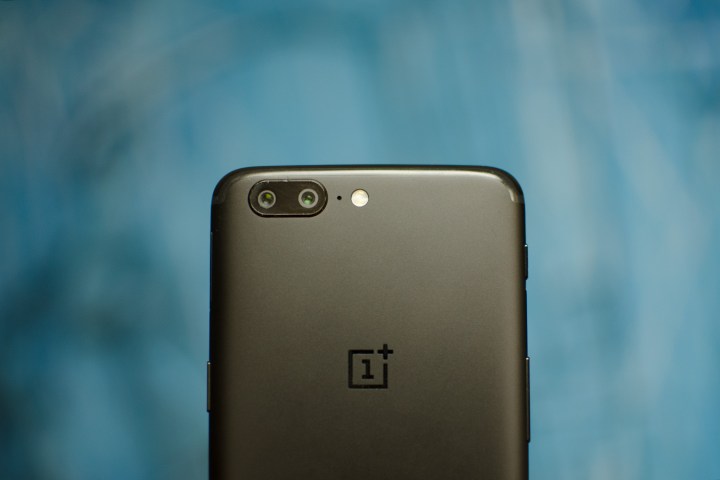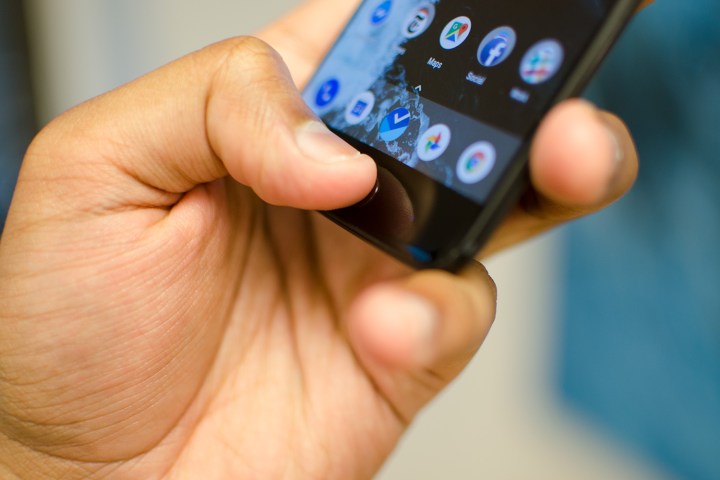- Performance powerhouse
- Wonderfully accessible software and user experience
- Competitively priced
- Strong, predictable fast charging system
- Creatively interesting camera
- No water resistance
- Image tuning won’t be for everyone
- Looks a lot like an iPhone
OnePlus sells one phone, which means to be successful, that device needs to be very good — talk about pressure. The OnePlus 3T has always been easy to recommend. It does everything pretty well, and costs less than many big-name rivals. Now it’s time for the sequel, but just because the OnePlus 3T is good, doesn’t mean the pressure is off. If anything, there’s more this time around.
The OnePlus 5 refines what made the OnePlus 3T so desirable even further. It does more, has more power, and looks even smarter. But what we really like is how it’s so incredibly accessible — the software is simple, and the features easy to understand. You just settle into using the OnePlus 5 like sinking down into your favorite chair. This accessibility is really important; OnePlus has a somewhat geeky image, like it’s only suitable for tech-enthusiasts. The OnePlus 5 proves this isn’t true at all.
Apple is a master at making phones like this, and the iPhone’s influence runs through the OnePlus 5 very clearly. It sometimes steps over the line from homage to imitation. Our OnePlus 5 review shows how the company impressively manages to rise above this, to achieve a level of brilliance that separates it from other high-end smartphones. Here’s how.
An iPhone clone
From the back, the OnePlus 5 really, really looks like an iPhone. The midnight black color scheme, carried over from the limited edition OnePlus 3T, is extremely close in shade to the matte black iPhone. The OnePlus logo shines in glossy black in the top center, and in the top left is a dual-lens camera flanked by a flash unit. Body-colored antenna bands curve around both ends of the OnePlus 5, just like they do on the iPhone.
In the past, companies like Huawei have been accused of copying the iPhone’s design, and while it still does to a certain extent, it has found its own style more recently. OnePlus says the OnePlus 5 is the result of its most expensive design process yet, and more than 100 prototypes were made before deciding on this one. It’s surprising then, to see it came up with an unashamed and unsubtle iPhone clone. The fact it’s reminiscent of the iPhone doesn’t make it ugly — it actually looks very attractive.
The edges of the rear curve towards the front display, which makes it feel natural in the hand — but it doesn’t allow a firm grip. It doesn’t help that our midnight black variant is quite slippery, too.
The right side features a power button, and on the left is the volume rocker, along with OnePlus’ excellent Alert Slider. It quickly switches between alert notification profiles, and It’s very helpful, allowing you to silence your phone without actually looking at the screen. The slider is textured so you don’t even need to take the phone out of your pocket.
It does more, has more power, and looks even smarter.
The OnePlus 5 is also really thin and light. The metal body weighs 153 grams and is 7.25mm thick, which is thinner than the 8mm Samsung Galaxy S8, and a tad lighter. On the front, a 2.5D curved piece of Gorilla Glass 5 covers the 5.5-inch, 1,920 × 1,080 pixel AMOLED screen. A fingerprint sensor hides inside the home button. It’s not a physical button, but it offers a pleasing vibration when pressed. The Recents and back button flank the home button — there’s no distinctive icon, but they light up when pressed.
There’s no denying the OnePlus 5 looks like an iPhone; but no, it shouldn’t put you off. It still looks great, the build quality is excellent, it has a 3.5mm headphone jack, and it’s super thin.
Accessible software, fantastic performance
When we commented on the OnePlus 5’s accessibility, we were referring to how pleasant the phone is to use. This is due to the Android 7.1.1 Nougat operating system and OnePlus’s own Oxygen 4.5.0 user interface, along with the Snapdragon 835 processor and 8GB of RAM. The OnePlus 5 is a fiery combination of raw ability and careful software tweaks, producing a devastatingly fast yet friendly-to-use smartphone.
An example of this is the camera app. On the LG G6, the Square Camera app — which makes good use of the phone’s wide screen — is a widget, and not built into the main camera app. If it gets deleted, or hidden, you have to know to look for it in the widget menu. The OnePlus 5’s Portrait mode is accessed with a swipe to the left in the main camera app. Swipe to the right for video. That’s it. Simple, and obvious.
A devastatingly fast yet friendly to use smartphone
The Oxygen user interface is very subtle, and unlike others, doesn’t obfuscate primary Android features. In fact, it’s quite similar to the software experience on the Google Pixel. The app drawer is accessed with an upward swipe, the notification shade is standard, and the icons are minimalist and not over-styled. OnePlus’ Shelf feature is one of the few alterations. It’s hidden to the left of the home screen, and shows handy, glanceable pieces of information, but it can be deactivated if you prefer. Other features include an auto night mode that uses the ambient light sensor to adjust the color temperature of the screen, a blue-light filtering reading mode, a do-not-disturb game mode, and a tap-to-wake option for the screen.
Oxygen OS is fluid, the animations are slick, and we never experienced any slowdown at all. The OnePlus 5 is a joy to use, and it’s not just raw power that makes this possible. OnePlus has implemented a special algorithm that preloads frequently used apps, and shifts resources away from apps that are rarely used. It has also worked to optimize the screen for touch sensitivity, making it very responsive indeed. Put all this together, and the end result is sublime. We tested it against a Google Pixel, opening apps at the same time, and the OnePlus 5 was a hair faster. To be fair, the Pixel does have an older processor.
Google Assistant is onboard, and after a period where it refused to work in the United Kingdom after the phone’s release, it operates without a problem now.
We’ve played a series of games on the OnePlus 5, from Happy Hop and Parking Master 3D, to Dodonpachi Unlimited and Reckless Racing 3, without any overheating issues or any slowdown. Streaming video is also faultless, and doesn’t suck much power — a 22-minute show streamed from Crunchyroll only used 4 percent battery life.
Qualcomm’s newest, and fastest processor — the Snapdragon 835 — definitely helps the OnePlus 5 achieve all this. Here are some benchmark scores we received:
- AnTuTu: 181,599
- 3DMark Slingshot Extreme: 3,549
By comparison, the Samsung Galaxy S8, which has the same processor and a little less RAM, received a score of 155,253 on AnTuTu, and 2,052 on 3DMark. There’s a word for what happened here, and it’s “trounced.”
It’s crucial to note, however, that at least one third-party reviewer found evidence of benchmark manipulation. According to XDA Developers, the OnePlus 5 keeps CPU frequencies artificially high during the test, which results in significantly higher overall scores in the multi-core test.
“People use benchmark apps in order to ascertain the performance of their device, and we want users to see the true performance of the OnePlus 5,” OnePlus told Digital Trends in statement. “Therefore, we have allowed benchmark apps to run in a state similar to daily usage, including the running of resource intensive apps and games. Additionally, when launching apps the OnePlus 5 runs at a similar state in order to increase the speed in which apps open. We are not overclocking the device, rather we are displaying the performance potential of the OnePlus 5.”
In subsequent statements, the company clarified that it isn’t overclocking the OnePlus 5’s processor, and that it hasn’t implemented a “frequency floor” to boost performance.
Regardless, take the benchmark scores with a grain of salt. We’ve yet to see any performance issues with the OnePlus 5 itself.
8GB/128GB or 6GB/64GB OnePlus 5?
The difference between the two versions of the OnePlus 5 comes down to RAM and storage space. The $480 version has 6GB/64GB, and the $540 model has 8GB/128GB. We asked a few experts, and the difference is marginal, and you likely won’t be using anywhere close to 8GB — if anything, more RAM may use up more battery. OnePlus justifies such a giant number by saying it allows more apps to run in the background, and it helps futureproof the phone.
“With 8GB of RAM, the OnePlus 5 allows all users to easily run the most powerful applications and eliminates all doubt in its ability to do so in the future,” the company told Digital Trends.
We initially reviewed the 8GB OnePlus 5, and concluded that it has more speed, power, and ability than most people need. Since then we’ve spent time with the 6GB OnePlus 5 and found that under normal, everyday situations, it’s impossible to tell it has 2GB of RAM less. Games run in the same way, apps open at the same speed, and scrolling through Oxygen OS is an identical experience. The minute differences are only noticeable when the two sit side-by-side, and when dozens of apps are open. Even then, differences may come down to connection speed.
The whopping 8GB of RAM isn’t a reason to spend more money on the OnePlus 5. Having more storage space is, as the phone doesn’t have a MicroSD card slot — you’re stuck with what’s available. Having more space to store apps and media means your phone will stay useful for longer, and that’s worth the extra money. However, if you stream everything, and store all your photos in the cloud, then you won’t be left with a device that’s too slow if you opt for the cheaper 6GB model.
Camera
The OnePlus 5’s camera mimics the dual-camera setup on the iPhone. There are two Sony lenses on the back, a primary with 16 megapixels and a telephoto with 20 megapixels. These provide a 2× hybrid zoom system, and a bokeh-style Portrait mode — which is exactly what Apple calls it, and it even says “depth effect” when the feature is active, just like in iOS — for the desirable blurred background effect.
The excellent news is the main camera’s aperture is now rated at f/1.7, letting in 26 percent more light than the lens on the OnePlus 3T, plus auto-focus has been tweaked for a 40 percent speed increase. This joins improved HDR, and new features like a histogram, and a level-like reference line to ensure the horizon is straight. Annoyingly, this is only available in the camera’s Pro Mode.
Let’s talk about Portrait mode first. On release, the depth effect mode was slow to work. You had to stop and wait for the camera to focus on its subject and blur out the background, almost like the phone had to think about what it needed to do. This is unlike the iPhone 7 Plus, where you adjust the distance between the camera and the subject until Depth Effect activates.
Since then OnePlus has updated the software several times, and the Portrait mode is considerably faster, and more effective. It grabs on to the subject very quickly and refuses to let go, even when you shift distances quickly. When you have captured a Portrait picture, the results are mostly excellent. The depth of field is highly accurate, with the OnePlus 5 picking out edges with greater accuracy than the iPhone in some situations. This is mainly due to it often taking a wider view, and not separating one small object like Apple’s software. Outside of Portrait mode, the OnePlus 5’s camera is relatively standard, meaning you get a panorama mode, slow motion video, a pro mode, and a couple of scenes.
Comparing shots with the iPhone 7 Plus reveals a massive difference between the way it handles color and contrast. The iPhone is adept at taking natural images, replicating what you see in the real world. The OnePlus 5 takes pictures like it’s on LSD. Colors and contrast are amplified to the max. It’s akin to Samsung’s philosophy of providing stunning, hyper-real pictures we want to share, regardless of whether that’s actually how the scene looked.
The OnePlus 5’s camera is going to divide opinion; but if you regularly use an HDR filter to augment your pictures, you’ll love it. But the overly saturated look means some colors and situations look weirdly “off.” A forest scene we photographed looked decidedly strange, for instance, as no trees produce such a bizarre shade of green.
OnePlus has added electronic image stabilization to the 4K video mode in a subsequent software update, and there is a noticeable difference when comparing them side-by-side. It’s certainly not the smoothest video you’ll shoot, but it’s better than nothing. Both cameras have electronic image stabilization for stills too.
Battery and connectivity
The OnePlus 5 has a 3,300mAh battery inside, and it’s coupled with the company’s proprietary Dash Charge fast charging system. This is one of the best fast charging solutions available, and OnePlus promotes it as offering, “a day’s power in half an hour.” In reality, this means it charges the battery to about 60 percent capacity in 30 minutes, then on to a full charge in under 90 minutes.
This is one of the best proprietary fast chargers available, and OnePlus promotes it as offering, “a day’s power in half an hour.”
In our tests, the OnePlus 5 dropped to 50 percent by 10 p.m. with average use, so provided you’re not a really heavy user, the statement of getting a day’s use from 30 minutes charge should be accurate. The power of knowing how long it takes the fast charge system to top-up the battery shouldn’t be underestimated. Most of us will be able to plug the phone in after waking up in the morning, and categorically know it’ll have at least 60 percent charge ready for when we leave the house for work. It’s an extremely useful feature, and one that delivers on its promise.
Bluetooth 5.0 is onboard, providing more range for compatible connected gadgets, and more speed. The phone has a dual-SIM tray, but without space for a MicroSD card, so you’ll have to make do with the onboard storage. This is either 64GB or 128GB. The OnePlus 5 has 34 GSM bands for global connectivity, so it should provide the fastest connection wherever you are
Price, warranty, and availability
OnePlus sells its phones unlocked without a contract through its own website. This is an excellent way to buy a device, as it gives you freedom to choose your network, when you can upgrade, or the option to sell the phone privately in the future. In the U.K., the O2 network will also offer the phone for sale with a variety of contracts.
The 64GB version comes in slate grey and with 6GB of RAM for $480, and is the cheapest way to buy the phone. Choose the $540 OnePlus 5 with 128GB of storage and 8GB of RAM and you have the choice of either slate grey or midnight black. The difference between the two is extremely subtle, and unless the light is just right, few will quickly tell them apart.
OnePlus has also released a limited edition soft gold OnePlus 5, which has a gold body and a white front instead of a shade of black. It looks great, and catches the light in an attractive way. However, it’s only available with 6GB of RAM and 64GB of storage space, and costs the same at $480.
OnePlus has a one-year warranty on its devices in the United States, and broken phones will be repaired or replaced free of charge — that includes shipping and handling costs. It doesn’t cover daily wear and tear, or water damage. OnePlus also offers an extended warranty plan though Assurant Solutions called On-Guard for a year, 18 months, or two years. Because claims are dealt with in the U.S, it should be quicker. You’ll have to pay between $20 and $110 extra for the privilege.
Our Take
The definition of flagship phone is changing. The most expensive phones have cutting-edge designs, virtual assistants, and complex, long feature lists that those who buy them only rarely use. Phones like the Galaxy S8, the LG G6, and Apple’s iPhone 7 Plus have become hyper phones. Expensive, luxurious, and generally a bit over-the-top.
The OnePlus 5 isn’t like them. It boils down the essence of the flagship phone to become leaner, meaner, and fiercer. It gives us the best processor, the most amount of RAM, a very capable (but divisive) camera, no-nonsense software, and a slick design for just $480. It could leave $200 in your pocket if you choose it over one of the aforementioned flagship smartphones. Who doesn’t want to save money without compromising?
While we’re singing the OnePlus 5’s praises, there are some other points to consider. Spec-fiends may prefer a 2,560 x 1,440 pixel resolution screen, music and video fans may want a MicroSD card slot, and others may simply not want a phone that looks like the iPhone. There’s also no waterproofing, which is becoming a standard feature in all high-end smartphones. They’re all valid points, but the benefits do outweigh the negatives here.
Is there a better alternative?
The OnePlus 5 stands apart at this price, and for this specification. Its main challenger comes from Honor, the sister brand to Huawei, with the Honor 8 and Honor 8 Pro. The Honor 8 Pro has a larger screen with a higher resolution, and Huawei’s high performance Kirin 960 processor inside, with a dual-lens camera on the back of the device. It costs 480 British pounds, but isn’t available in the United States.
In the U.S., the aging, smaller Honor 8 costs less and has a dual-lens camera, but the processor is older than the Honor 8 Pro’s Kirin 960, and the display isn’t the best around. If you’re also considering an iPhone, then budget restraints mean you’re limited to the iPhone SE. It’s a fine device, but doesn’t come close to matching the OnePlus 5.
Ignore the OnePlus 5’s low price, and we’d recommend the Google Pixel, which benefits from a superb camera, regular software updates, and a similarly excellent software and usability experience. But you’ll have to dig deep for one, as it costs $650.
How long will it last?
Short of breaking the phone, or submerging it in water, the OnePlus 5’s lifespan will likely be two years at the minimum before you’d need to consider changing to a newer phone. It won’t stop working at this time, of course, and will continue to be an excellent everyday device beyond this.
The lack of water resistance is one of the phone’s biggest downsides. Even the iPhone has managed it, and it’s a shame the OnePlus 5 didn’t follow along. We do like the new carbon fiber silicone case that’s available, which adds plenty of impact protection, and makes the phone more comfortable and less slippery to hold. It’s a worthwhile addition.
OnePlus does update the software on its phones, but not in such a timely fashion as Google does with the Pixel series. It has recently stopped offering software updates for the OnePlus 2, a phone released in mid-2015, so 2019 may end up being the end of support for the OnePlus 5. Our review phone had the May 1 Android security update installed, and this hasn’t changed since then, despite several over-the-air software updates.
Should you buy it?
Yes, yes, and yes again. The OnePlus 5 is almost fuss and frustration free, doesn’t overwhelm with pointless features, and saves you money over the competition. What more do we want?
Update: We’ve added impressions of the 6GB/64GB OnePlus 5, revisited the camera, and discussed the recent software updates.





























